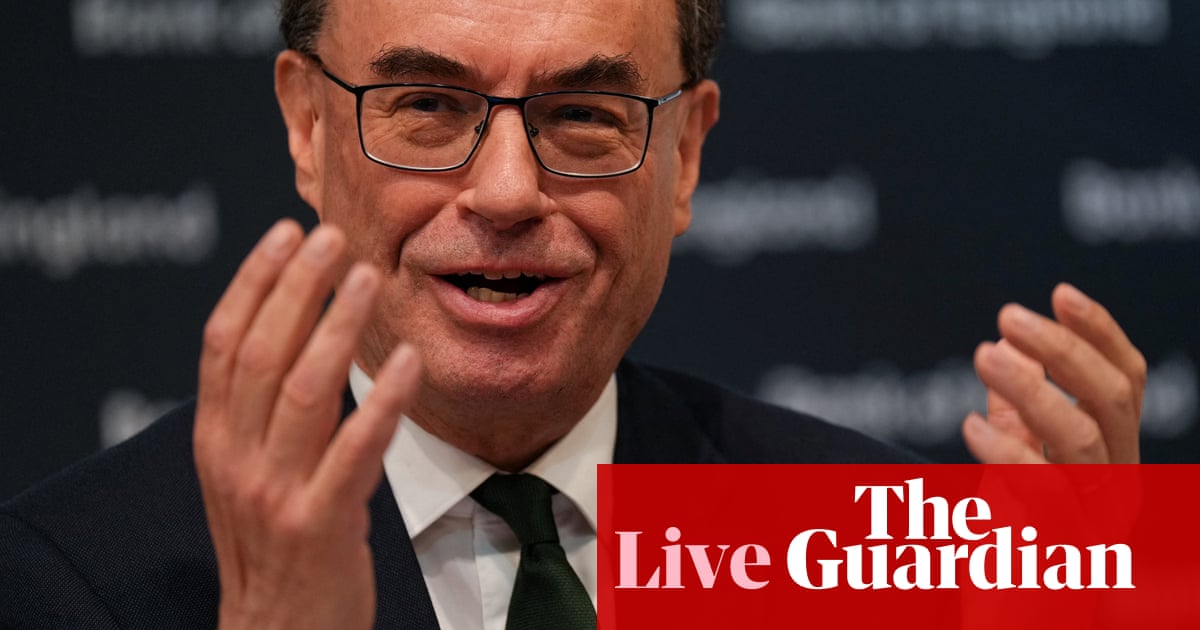The Governor of the Bank of England has called for Britain to “rebuild” its trade relationship with the European Union, as the UK celebrates yesterday’s trade deal with the US.
AndrewBaileyhastold the BBCthat reversing the post Brexit hit to UK-EU trade would be “beneficial”.
And whileBaileywas keen not to take a view on Brexit, as a public official, he also argued that a closer relationship between the UK and the EU would help the economy and inflation.
Baileysays:
That relationship could be improved later this month, when a crucial EU-UK summit is held.
As we covered inyesterday’s blog,Baileywas also pleased that the US and UK had reached a trade deal, telling the Beeb:
But while Donald Trump hailed that agreement yesterday, it still leaves the UK facing 10% tariffs on shipments to the US.
Germany’s stock market has recovered all its losses following Donald Trump’s “Liberation Day” tariff shock five weeks ago.
The Dax, which tracks the largest companies listed in Frankfurt, has risen over its previous record high – set in March – this morning.
Bloombergreports:
Shares are rising in London in early trading as well.
TheFTSE100index of blue-chip shares has gained 32 points, or 0.4%, to 8564 points.
RetailerJDSports,whose US operations are vulnerable to US tariffs on goods made in China, are up 2%, among the top risers.
Officials from the US andChinaare due to hold talks in Switzerland this weekend, which may be the first step toward resolving their trade war.
The US-UK trade deal has also lifted sentiment in the City, reportsDerren Nathan,head of equity research atHargreaves Lansdown:
European stock markets have opened higher, amid hopes of progress in the US trade wars.
Germany’s DAX has jumped by 0.6% at the start of trading, with France’s CAC up 0.5%, with suggestions that the US-UK trade deal is a sign that other countries will be able to reach agreement with Washington too.
Ipek Ozkardeskaya, senior analyst atSwissquoteBank, says news of yesterday’s US-UK deal resonated positively across global financial markets – even though Trump hasn’t lifted his baseline 10% tariff on UK goods.
Ozkardeskayaexplains:
Yesterday, Donald Trump teased us by revealing that an unnamed UK company had bought $10bn of planes from Boeing.
And this morning,BritishAirways’ parent company has revealed itself as the buyer.
International Airlines Group (IAG)stated, in its latest financial results, that it has ordered 53 aircraft for its medium-term long-haul fleet requirements.
Reports that the US will have a veto over Chinese investment in Britain as a result of the UK-US trade deal are “complete nonsense”, Treasury minister Darren Jones has insisted this morning.
The Telegraph reported that such a veto is part the deal, but Treasury ministerMrJonestold Times Radio:
OurFirstEditionnewsletterhas kicked the tires on the US-UK trade deal, showing that it is far from comprehensive, but will help crucial British industries such as car-making.
The broader economic impact may be limited, though. As our economics editorHeatherStewartput it:
The Governor of the Bank of England has called for Britain to “rebuild” its trade relationship with the European Union, as the UK celebrates yesterday’s trade deal with the US.
AndrewBaileyhastold the BBCthat reversing the post Brexit hit to UK-EU trade would be “beneficial”.
And whileBaileywas keen not to take a view on Brexit, as a public official, he also argued that a closer relationship between the UK and the EU would help the economy and inflation.
Baileysays:
That relationship could be improved later this month, when a crucial EU-UK summit is held.
As we covered inyesterday’s blog,Baileywas also pleased that the US and UK had reached a trade deal, telling the Beeb:
But while Donald Trump hailed that agreement yesterday, it still leaves the UK facing 10% tariffs on shipments to the US.
Good morning, and welcome to our rolling coverage of business, the financial markets, and the world economy.
Trade between the US andChinacooled sharply last month, new data shows, as Donald Trump’s tariff war hit demand.
The latest trade data from China shows that shipments to the US fell 21%, year-on-year, in April. That indicates the tariffs imposed on China by Trump, which rose to 145% during April, hurt trade.
Shipments the other way fell too. China’s imports from the US fell by almost 14%, after Beijing’s tit-for-tat tariffing raised its tariffs on US goods to 125%.
But… the broader picture is that China’s overall exports jumped by 8.1% in April, year-on-year, beating forecasts for a 1.9% rise, while imports dipped by 0.2%.
Economists have suggested that countries around the world are scrambling to take advantage of Donald Trump’s 90-day pause to the tariffs he announced at the start of April (not including China, though). That is leading to stronger demand for China’s materials.
Stephen Innes,managing partner atSPI Asset Management,says:
9.40am BST: Bank of England governor Andrew Bailey to give keynote address at the Reykjavik economic conference 2025
12.15pm BST: Bank of England chief economist Huw Pill gives the national Monetary Policy Committee agency briefing
